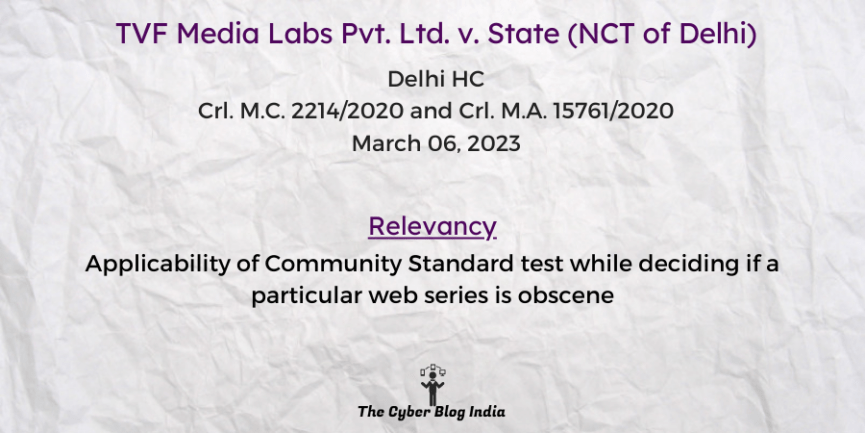TVF Media Labs Pvt. Ltd. v. State (NCT of Delhi)

TVF Media Labs Pvt. Ltd. v. State (NCT of Delhi)
(2023) 1 HCC (Del) 778
In the High Court of Delhi
Crl. M.C. 2214/2020 and Crl. M.A. 15761/2020
Before Justice Swarana Kanta Sharma
Decided on March 06, 2023
Relevancy of the Case: Applicability of Community Standard test while deciding if a particular web series is obscene
Statutes and Provisions Involved
- The Information Technology Act, 2000 (Section 2, 67, 67A)
- The Indian Penal Code, 1860 (Section 292, 294)
- The Indecent Representation of Women (Prohibition) Act, 1986 (Section 2C, 3, 4)
- The Constitution of India, 1950 (Article 19(1)(a), 19(2))
- The Code of Criminal Procedure, 1973 (Section 154(3), 156(3), 482)
Relevant Facts of the Case
- The petitioner owns the impugned web series (College Romance) and the YouTube channel The Timeliners. This series is available on various video streaming platforms. It is open for the public to watch without any warning, stating that the content contains explicit material or an age restriction.
- The web series contains obscene and vulgar material, especially against the women in the series. Mainly, Episode 05 of Season 01, called ‘Happily Fucked Up,’ is prima facie vulgar because of its inappropriate title. Moreover, the episode contains obscene language and indecent portrayal of women.
- In response to the petitioner’s revision petition, the learned Additional Sessions Judge ruled that abusive language may not constitute obscenity. The petitioner’s web series is only available online. As a result, Sections 292 and 294 of the Indian Penal Code, 1860, cannot coexist with Section 67A of the Information Technology Act, 2000.
- The learned ASJ ruled in response to a revision petition submitted by the petitioner that abusive language may not constitute obscenity. The content is displayed only online. If the material is restricted to digital medium exclusively, then Sections 292 and 294 IPC cannot coexist with Section 67A IT Act. The remaining arguments focused on the definition of the whole.
- The petitioner seeks to quash an order passed by the Additional Chief Metropolitan Magistrate. This order directed the SHO to file an FIR against the petitioner to investigate the complainant’s allegations.
Prominent Arguments by the Advocates
- The petitioner’s counsel argued that the impugned order does not comply with the requirements of Section 154(3) of the Code of Criminal Procedure, 1973. In the present case, Section 156(3) will not be applicable due to non-compliance with Section 154(3). Further, the web series contents do not come under Section 67A of the Information Technology Act, 2000. It does not breach any obscenity laws. The test for obscenity should be an ordinary man’s common sense.
- The respondent’s counsel submitted that compliance with Section 154(3) is unnecessary. It is evident from the provision’s language that it is suggestive in nature rather than mandatory. Further, the show depicts the lives of Delhi University students. As an alumnus of the University, he believes the show harms the University’s reputation.
Opinion of the Bench
- The appropriate provision for the adjudication of this case is Section 67 instead of Section 67A.
- The Community Standard test is a reliable test to judge obscenity. The court also discussed various judicial precedents and dictionary meanings for works such as vulgar and obscene.
- The Community Standards test’s essential ingredient is viewing the content as a whole and judging it from an average person’s perspective by applying contemporary community standards.
- The language of the series, viewed as a whole, was indecent. Hence, Section 67 is applicable here.
- Moreover, the first petitioner violated the IT Rules, 2021 by not classifying the content or issuing a warning regarding the expletive language.
- The learned ASJ’s order on the applicability of relevant provisions is correct in the eyes of the law.
- However, the direction to register an FIR does not give the authorities the power to arrest any of the petitioners.
Final Decision
- The court disposed of the petition while directing YouTube to take appropriate remedial steps as per the IT Rules, 2021.
Ananya Dixit, an undergraduate student at Symbiosis Law School, Hyderabad, and Risha Thomre Rajani, an undergraduate student at NMIMS Kirit P. Mehta School of Law, Mumbai, prepared this case summary during their internship with The Cyber Blog India in May/June 2023.
